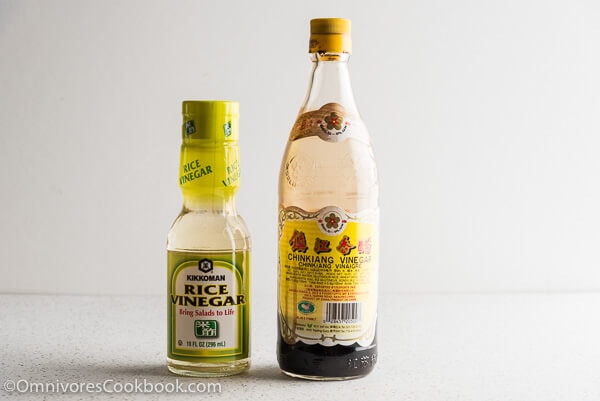
Although Chinese cooking uses both Chinkiang vinegar (also called Chinese black vinegar) and rice vinegar, the former is used more often in authentic Chinese cuisine.
Chinkiang vinegar (Zhenjiang vinegar, 镇江香醋) is a type of Chinese black vinegar. It is made from various grains and is aged until the color turns dark brown or inky black. It has a rich, pungent, and tart flavor, sometimes with a hint of sweetness. It has a fermented malty taste and woody character that distinguish it from the light colored and fruity rice vinegar.
For most Chinese recipes, if a recipe says to use rice vinegar without specifying the type, it usually means black vinegar. For certain dishes, such as vinaigrette cabbage, Kung Pao chicken and spinach salad, you should only use black vinegar.
On the other hand, certain dipping sauce or sweet and sour sauce calls for the lighter color rice vinegar.
Types
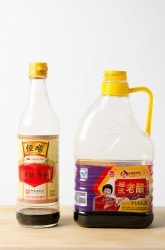 There are four famous brands of black vinegar in China, all made from different ingredients and have distinct flavors. I usually keep two types of black vinegar in my pantry, Chinkiang vinegar and Shanxi Extra Aged.
There are four famous brands of black vinegar in China, all made from different ingredients and have distinct flavors. I usually keep two types of black vinegar in my pantry, Chinkiang vinegar and Shanxi Extra Aged.
Chinkiang vinegar is made from glutinous rice and has a well balanced sour flavor and milder than extra aged vinegar. It’s commonly used in southern parts of China, and it is the most commonly used black vinegar outside of China.
Shanxi Extra Aged (山西老陈醋, shan xi lao cu), or Shanxi superior mature vinegar, literally means old vinegar in Chinese. It’s made from sorghum, barley and pea. Shanxi vinegar is usually aged for 9 to 12 months. But some superior types are aged for 3 to 10 years. The extra aged vinegar has a very rich flavor and umami, well balanced in sweetness, and taste much more pungent than Chinkiang vinegar. It is the only right type of vinegar to used in noodles for many Chinese people.
Tianjin Duliu Vinegar (天津独流醋, tian jin du liu cu), an aged vinegar made from rice and wheat, has a lightly sweet flavor and is less acidic than Chinkiang vinegar. It’s commonly used in northern China and is especially nice for making dumpling dipping sauces and cold appetizers.
If you are new to Chinese cooking, I recommend you start with Chinkiang vinegar. It has a very standard flavor and can be easily found at a Chinese market. You can also use other types of aged vinegar as alternatives. Depending on the brand of black vinegar, its sweetness and sourness will vary a lot. It might result in a slightly different flavor and character for a finished dish, and you will want to add other ingredients (saltiness and sweet) to balance the flavor.
Buy
You can find Chinkiang vinegar in Chinese market, Asian market, or on Amazon. To get other black vinegar, you might need to try large Asian market or Chinese market. As for the lighter color rice wine, we usually use Japanese brand. You can find it in most Asian market or on Amazon.

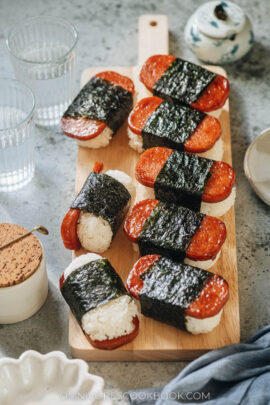
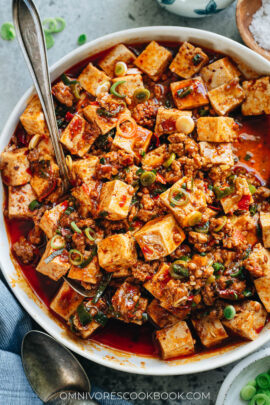
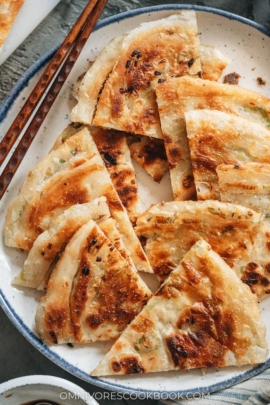
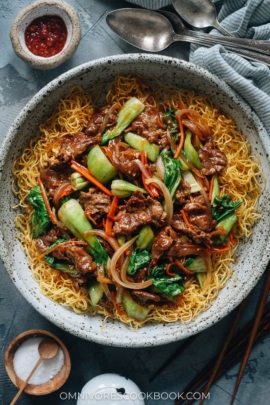
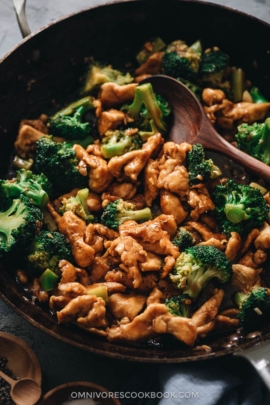
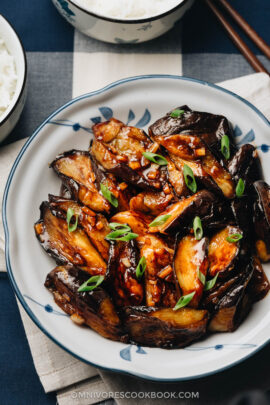






How different is Chinese Black Vinegar from Italian Balsamic? It appears to me that they are interchangeable.
They are both aged dark vinegar and yes they share similarities. But Chinese black vinegar is made from rice and balsamic is made from grapes, so they taste quite different. I’d say, if you make an American Chinese dish, such as General Tsao’s chicken, they are indeed interchangeable. But if I want to make a dipping sauce for traditional dumplings or noodles, I won’t use Balsamic.
thank you for carefully listing ingredients. I am very allergic to peas and never would have thought a vinegar (shanxi) would be made with peas
Thank you for this information. I have a bottle of diluted black vinegar. Is this the same or similar? I bought it out of curiosity and now have no idea how to use it.
Are you sure it’s diluted vinegar not distilled? I’ve never used diluted black vinegar. After a quick search I found a few brands online. I think it might be a type that is made for dipping sauce.
Thank you from South Korea! I’ve been eating a lot of Chinese food since I lived in China but I just started cooking Chinese food and I am terribly lost.
Q1) I grew up eating Hot & Sour soup (I think it is called Suan La tang) from a Cantonese restaurant and I wanted to recreate it but the taste and balance is a little off when I cooked it. I used Shanxi black vinegar aged for 3 years. This is the only ingredient that could go wrong since other ingredients are standardized. Is this the right type to use for Hot & Sour soup?
Q2) I just cooked Kung pao chicken according to an instruction from Youtube channel “Taste Show”, (To me, they seem to be experts on Chinese cooking, but correct me if I’m wrong.) and again the taste and balance seems a bit off from my experience from Chengdu. The sauce calls for equal part light soy, dark soy, sugar, cooking wine, black vinegar (plus chicken stock but i omitted this). Is 3 year old Shanxi black vinegar right vinegar to use?
Is Chinkiang black vinegar a better option?
I think Shanxi black vinegar is a bit too pungent when cooking with it and we use it mostly for dumpling dipping sauce. Chinkiang vinegar is lighter and slightly sweet and it’s often used in those recipes you mentioned. So if you use the black vinegar instead, the taste might be a bit off.
For the hot and sour soup, different regions might use different recipes (the one I had in Hong Kong uses chili oil and rice vinegar). I’m from Beijing and we uses Chinkiang vinegar and white pepper.
If you are interested to try out I have both recipes on my blog
https://omnivorescookbook.com/kung-pao-chicken/
http://omnivorescookbook.com/recipes/authentic-hot-and-sour-soup
Hello, this looks so good and I’d love to try it! I have Celiac disease so no gluten (wheat, barley, rye). Do you know of an option for a substitute for the black vinegar that would be safe for me to eat? Thank you!
Chinkiang vinegar has a strong fermented flavor that is very unique, so I do not have a great alternative for the gluten-free version. You can use Japanese or Chinese rice vinegar in many dishes and still have great result. For dishes like hot and sour soup, rice vinegar might not offer a flavor that’s strong enough. Some cookbooks recommend balsamic vinegar, but I think it’s a bit too fruity and sweet as a replacement.
I loved reading your blog and your vegetable and tofu recipes; I’m really keen on Asian food. Your knowledge is very specialised and superior to many sites I’ve tried. I’d love you use your talents to explore more vegetable, legume & tofu combination recipes, perhaps a fusion of east and west (?)
Just reaching out to tell you how much I enjoy your site. You have become one of my go-to references. I have been able to update my pantry based on your recommendations and have tried many of your recipes which have turned out wonderfully.